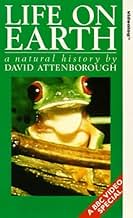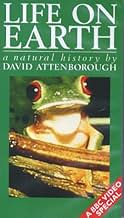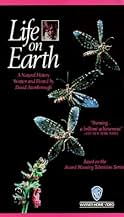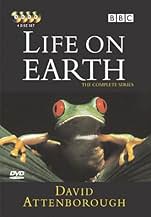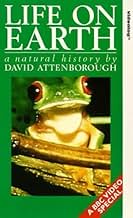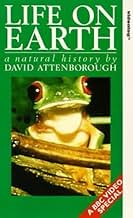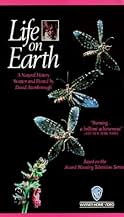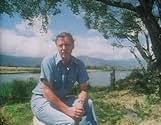Life on Earth
- Miniserie de TV
- 1979
- 54min
CALIFICACIÓN DE IMDb
9.1/10
3.4 k
TU CALIFICACIÓN
El innovador estudio de David Attenborough sobre la evolución de la vida en nuestro planeta. .El innovador estudio de David Attenborough sobre la evolución de la vida en nuestro planeta. .El innovador estudio de David Attenborough sobre la evolución de la vida en nuestro planeta. .
- Elenco
- Nominada a4premios BAFTA
- 1 premio ganado y 4 nominaciones en total
Explorar episodios
Opiniones destacadas
The opening music - redolent of `Also Sprach Zarathustra' - still sends a shiver down my spine. One hears it and just KNOWS that this is one of THE ground-breaking television documentaries of all time. Some of the detail is bound to be outdated by now; but so far as presentation is concerned, `Life on Earth' is timeless, wearing its years far more lightly than `Cosmos' does, or than `The Civil War' will.
The title says it all. Attenborough is giving us nothing less than the story of life on Earth, from the beginning to the present, but concentrating on a few key innovations (episodes bear titles like, `The Invasion of the Land', `A Watertight Skin', `Pouch and Placenta', and so on). The other emphasis is on the poetry of life on Earth. So it's not an even-handed history. What we're getting is a look at the origin of particular things alive today: so birds get much more attention than trilobites; animals get more attention than plants; mammals get more attention than insects; and we hominids have a whole episode to ourselves. This is as it should be. When cockroaches start making documentaries, they can concentrate on what interests THEM; but tough luck, they can't, so it's our show. All the same, watching the final episode (`The Compulsive Communicators'), AFTER having watched all the preceding episodes, gives us a stronger feeling of our true place in evolutionary time than any number of diagrams or Carl Sagan calendars.
This gets my vote for being Attenborough's best work, the best television documentary ever made, and possibly (not that I know enough to judge) the BBC's greatest achievement. It's long overdue for a re-screening.
The title says it all. Attenborough is giving us nothing less than the story of life on Earth, from the beginning to the present, but concentrating on a few key innovations (episodes bear titles like, `The Invasion of the Land', `A Watertight Skin', `Pouch and Placenta', and so on). The other emphasis is on the poetry of life on Earth. So it's not an even-handed history. What we're getting is a look at the origin of particular things alive today: so birds get much more attention than trilobites; animals get more attention than plants; mammals get more attention than insects; and we hominids have a whole episode to ourselves. This is as it should be. When cockroaches start making documentaries, they can concentrate on what interests THEM; but tough luck, they can't, so it's our show. All the same, watching the final episode (`The Compulsive Communicators'), AFTER having watched all the preceding episodes, gives us a stronger feeling of our true place in evolutionary time than any number of diagrams or Carl Sagan calendars.
This gets my vote for being Attenborough's best work, the best television documentary ever made, and possibly (not that I know enough to judge) the BBC's greatest achievement. It's long overdue for a re-screening.
10LW-08854
I thought this was the most impressive David Attenborough documentary I've ever seen. The scope and scale of what it achieves here is wonderful. The series first and foremost is about setting out to educate us not to entertain us or make us gasp. It looks at things in terms of the population level and not at the individual level. The range of locations covered is brilliant, Attenborough essentially tells the entire story of evolution right up to the present day and the innovations mankind has made over the last few hundreds years, not bad for such humble origins. The series employs lots of things to visually aid the story including both fossils and modern comparisons of animals today which highlight key changes such as the mudskipper and lungfish. The cinematography is lovely and it uses a lot of tripod shots so we don't have all the swirling and panning and constant movement that modern BBC series seem so obsessed with.
IT'S TRULY UNBELIEVABLE that this series is now over a quarter of a century old. That would just about make it old enough itself to both witness the ongoing phenomenon of evolution and to be carbon date for establishing age. (Well we admit to a bit of good spirited hyperbole and apologize to any of our readers who have trouble with the notion of "Evolution.*)
WE CAN WELL recall watching this with our then grade-school aged daughters, Jennifer an Michelle. We tried not to deceive them in any way, but we never told them that such outstanding viewing was also "educational." We just chalked it up to a soft sell and secretive version of Home Schooling.
WE NOW SEE that this series gave us a 'Baker's Dozen episodes that covered Life On Earth "from Soup to Nuts", or so to speak. All questions about life today and in the distant past was brought to the forefront for our consideration. All of the best evidence of how things got the way that they did were presented. This was framed in the most beautiful manner with the best in both the colour photography as well as the musical score.
ANOTHER INTANGIBLE ELEMENT which added to the end result of the product's effectiveness on the viewing audience was the presence of David Attenborough himself. The great interest and enthusiasm projected by Sir David was both highly contagious and pleasantly infectious to all. The authoritative narration plus the enthusiastic manner in which it is delivered makes this Attenborough verbal dissertation a true equivalence of Carl Sagan's spoken word in his series, THE COSMOS.
ONE VERY HAPPY memory that we will always recall and cherish came on the viewing of one of the earliest installments. While lecturing on The Age of Trilobites in the ancient seas, Attenborough posed the question asking what was the closest living relative to the Trilobites I the World today?
WELL QUICK AS a flash Jennifer & Michelle's Pop (me) offered the answer as being "the Horseshoe Crab!" Right after, Sir David affirmed the veracity of my answer.
MODESTLY I SAID to myself quietly, "Oh Ryan, you've done it again!"
NOTE: * As far as one's belief in Creation vs. Evolution., must the two be mutually exclusive? We think not and take the position that the development of the various species indeed are interrelated; but are the result of the Creator (God) putting it all in motion in the beginning. Perhaps the misunderstanding starts with Charles Darwin's THE ORIGIN OF THE SPECIES. Contrary to the popular belief of so many, Darwin was never trying to explain the Origin of Life itself and neither is David Attenborough.
WE CAN WELL recall watching this with our then grade-school aged daughters, Jennifer an Michelle. We tried not to deceive them in any way, but we never told them that such outstanding viewing was also "educational." We just chalked it up to a soft sell and secretive version of Home Schooling.
WE NOW SEE that this series gave us a 'Baker's Dozen episodes that covered Life On Earth "from Soup to Nuts", or so to speak. All questions about life today and in the distant past was brought to the forefront for our consideration. All of the best evidence of how things got the way that they did were presented. This was framed in the most beautiful manner with the best in both the colour photography as well as the musical score.
ANOTHER INTANGIBLE ELEMENT which added to the end result of the product's effectiveness on the viewing audience was the presence of David Attenborough himself. The great interest and enthusiasm projected by Sir David was both highly contagious and pleasantly infectious to all. The authoritative narration plus the enthusiastic manner in which it is delivered makes this Attenborough verbal dissertation a true equivalence of Carl Sagan's spoken word in his series, THE COSMOS.
ONE VERY HAPPY memory that we will always recall and cherish came on the viewing of one of the earliest installments. While lecturing on The Age of Trilobites in the ancient seas, Attenborough posed the question asking what was the closest living relative to the Trilobites I the World today?
WELL QUICK AS a flash Jennifer & Michelle's Pop (me) offered the answer as being "the Horseshoe Crab!" Right after, Sir David affirmed the veracity of my answer.
MODESTLY I SAID to myself quietly, "Oh Ryan, you've done it again!"
NOTE: * As far as one's belief in Creation vs. Evolution., must the two be mutually exclusive? We think not and take the position that the development of the various species indeed are interrelated; but are the result of the Creator (God) putting it all in motion in the beginning. Perhaps the misunderstanding starts with Charles Darwin's THE ORIGIN OF THE SPECIES. Contrary to the popular belief of so many, Darwin was never trying to explain the Origin of Life itself and neither is David Attenborough.
Life on Earth is a comprehensive analysis of Life on this planet, ranging from the beginnings of life to the evolution of Homo sapiens. The individual episodes are chronological in relation to the colonisation and evolution of life generally. So the very first episode starts with the early earth and the environments found upon it, the last being about the great apes, with an emphasis on humans.
Life on Earth explains masterfully very complex and important concepts in Biology, going so far as to describe and explain DNA and how evolution changes it. Key concepts like these are explained using certain "case studies", i.e. specific species which are entertaining (and often funny) for the spectators, that inherently pertain to the subject being discussed. So, for example, the evolution of camouflage is analysed using the peppered moth, which changed during the industrial revolution because of the smog which blackened the trees.
Attenborough, nowadays, has a legendary reputation as the founder of accurate and entertaining wildlife film-making. And this is where it all started. This series is the base structure of every wildlife documentary ever made in and after the 80's. Attenborough is both a masterful story-teller and modest teacher, skillfully avoiding the two most fatal flaws in presenting, that still goes on today. Firstly, he avoids "telling" the spectators what to think or see as opposed to "showing" it to them, so they can make their own minds up, where many presenters use patronising language or over simplified explanations. And also, Attenborough remains humble throughout the whole process. Presenters today (2012) like Prof. Brian Cox seem pretentious in comparison, often appearing suddenly from behind pillars or speaking meaninglessly with the sun pointing towards the camera. Essentially, they use clever cinematography to waste screen time and "waffle" to use a technical term. Attenborough merely uses his presence as an aid for the audience, even as a guinea pig occasionally.
If you haven't seen this documentary and you are often inclined to watch such a program, get the box set now. It will be the best £15 you have ever spent, and you could learn a surprising amount about nature. I know I did.
HAIL! Sir David!
Life on Earth explains masterfully very complex and important concepts in Biology, going so far as to describe and explain DNA and how evolution changes it. Key concepts like these are explained using certain "case studies", i.e. specific species which are entertaining (and often funny) for the spectators, that inherently pertain to the subject being discussed. So, for example, the evolution of camouflage is analysed using the peppered moth, which changed during the industrial revolution because of the smog which blackened the trees.
Attenborough, nowadays, has a legendary reputation as the founder of accurate and entertaining wildlife film-making. And this is where it all started. This series is the base structure of every wildlife documentary ever made in and after the 80's. Attenborough is both a masterful story-teller and modest teacher, skillfully avoiding the two most fatal flaws in presenting, that still goes on today. Firstly, he avoids "telling" the spectators what to think or see as opposed to "showing" it to them, so they can make their own minds up, where many presenters use patronising language or over simplified explanations. And also, Attenborough remains humble throughout the whole process. Presenters today (2012) like Prof. Brian Cox seem pretentious in comparison, often appearing suddenly from behind pillars or speaking meaninglessly with the sun pointing towards the camera. Essentially, they use clever cinematography to waste screen time and "waffle" to use a technical term. Attenborough merely uses his presence as an aid for the audience, even as a guinea pig occasionally.
If you haven't seen this documentary and you are often inclined to watch such a program, get the box set now. It will be the best £15 you have ever spent, and you could learn a surprising amount about nature. I know I did.
HAIL! Sir David!
I wish I would have the whole series on video because this breathtaking event is a must-see for everybody who is interested in nature. David Attenborough shows footage which was never seen before. "Life on Earth" belongs to the most important television series of all time because it shows that the life on our planet is in danger to disappear forever. We need more series like "Life on Earth". Maybe then the mankind will understand that we can't do with our earth what we want.
¿Sabías que…?
- TriviaAn additional item on the DVD is David Attenborough being interviewed by fellow naturalist Tony Soper regarding the making of Life on Earth including the equipment used (at around 23 mins)
- Citas
David Attenborough: There are some four million different kinds of animals and plants in the world. Four million different solutions to the problems of staying alive. This is the story of how a few of them came to be as they are.
- Versiones alternativasThe original home video release was severely edited down to fit on two video tapes, meaning half or more of the original broadcast was omitted.
- ConexionesFeatured in Una zeta y dos ceros (1985)
Selecciones populares
Inicia sesión para calificar y agrega a la lista de videos para obtener recomendaciones personalizadas
- How many seasons does Life on Earth have?Con tecnología de Alexa
Detalles
Contribuir a esta página
Sugiere una edición o agrega el contenido que falta

